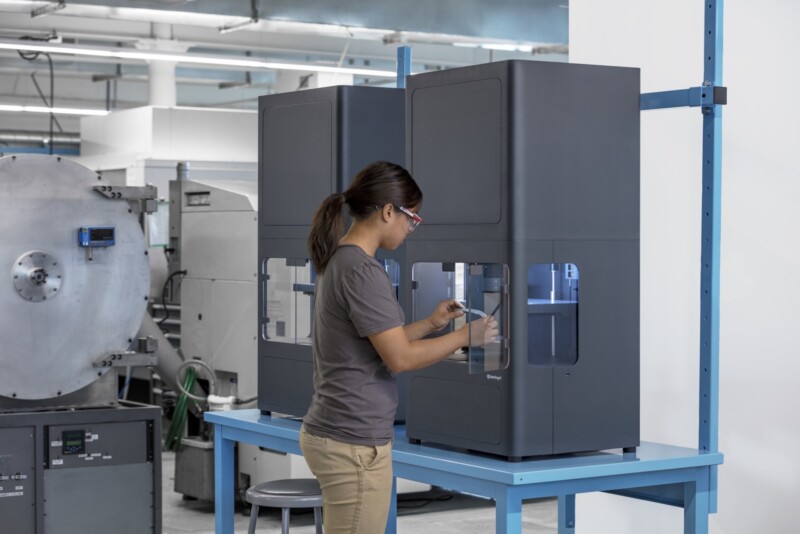
The U.S. Department of Veterans Affairs (VA)
The Customer
The Central Virginia VA Health Care System seeks to improve the lives of military heroes through innovation. For eligible veterans and active duty service members impacted by disabilities, the Assistive Technology team aims to offset the impact of disability and improve quality of life through services including evaluation, clinical intervention, and training.
To accomplish this, the team employs assisted technologies such as electronic cognitive devices, adapted automobile equipment, adapted sports and
recreation equipment, electronic aids to daily living, augmentative and alternative communication equipment, and adaptive computer access tools.

The Challenge
Using a pen is important in everyday life. But while many take it for granted,
some veterans and active duty service members have afflictions that
compromise grip strength, motor skills, or hand dexterity — limiting their
ability to hold pens.
Time is extremely valuable in clinical settings. In addition to seeing and
evaluating each patient, healthcare staff must also design unique splints to
solve each individual’s unique challenges. With the demands of a fast-paced
hospital setting, the team needed a reliable, quick, and simple way to make
customized splints with a flexible material. To solve this challenge, the team
turned to additive manufacturing technologies to speed up production times
and allow for shortened iterations and design cycles.
3D printing with TPU material offered the fastest and most economical way
to design, customize, and fabricate these splints — with the flexible qualities
of TPU promising the most impactful solution for the patient. However, 3D
printing TPU — a notoriously tricky material to print — proved to be more
difficult than anticipated. The team struggled with finding a reliable solution
that delivered high-quality prints every time.
To assist these patients, the Assistive Technology team sought out to design and fabricate a stylus holder — designed as a wrist strap with a slot — to help patients
securely hold a writing implement, stylus, or similar device.
– Brian Burkhardt, Clinical Rehabilitation Engineer, The Assistive Technology Team at the Central Virginia VA Health Care System“With Smooth TPU 95A, we are able to create parts in a material that is a better fit for our patients and their needs, allowing us to do things we couldn’t do before."

The Solution
The Central Virginia VA Healthcare System has used Markforged composite printers to successfully print rigid prosthetics with Onyx material, a Nylon filled with micro carbon fibers.
“Markforged technology has given us the capability to successfully collaborate with medical professionals and veterans to deliver a high-quality solution,” said Brian Burkhardt, Clinical Rehabilitation Engineer. “These printers just work, and enable us to deliver an elegant, high-quality end product for our patients.”
With the prior history of working with Markforged technology, Brian and team made the decision to introduce Smooth TPU 95A into their practice. They also purchased an Onyx Pro 3D printer for this specific application.

The Result
The capability to print with Smooth TPU 95A enabled the team to move the project forward quickly and efficiently. The stylus holder, designed as a wrist strap with a slot to help veterans with limited hand dexterity to securely hold a writing implement, is a design that takes advantage of the benefits of Smooth TPU 95A.
From validating the design to moving into custom production, they were able to tailor a unique design for each individual to provide an impactful end-use product. The engineers at the Assistive Technology team work with occupational therapists to design customized splints for their patients that work — granting them the ability to grip pens, pencils, and styluses.
With the combination of The Digital Forge’s hardware, software and materials, the team continues to use this part for different patients with similar needs, since they can quickly iterate to find a design that works for an individual patient and then scale to other patients by making tweaks to the initial design. Quick iterations and custom prints that were difficult with traditional manufacturing methods are now simple to execute and reliably deliver successful, high-quality TPU prints.

– Brian Burkhardt, Clinical Rehabilitation Engineer, The Assistive Technology Team at the Central Virginia VA Health Care System“Whether we are working on a prosthetic or stylus holder, the flexible nature of this new material gives us more capabilities to provide an elegant solution for our patients, making their lives easier."
The Future
Moving forward, the Assistive Technology team plans to utilize Smooth TPU 95A for other applications within their therapeutic treatments. Currently, the VA is in the process of trying to place a catalog of these designs on the NIH 3D Print Exchange to release them to the public so they are available for anyone to download and print them to improve their quality of life.
What can 3D printing Smooth TPU 95-A and other materials on the Digital Forge open up for manufacturers?
Read to learn more about:
- Smooth TPU 95-A
- What is Smooth TPU? Read this blog to learn about its benefits, properties, uses, and more
- Markforged industrial composite and metal 3D printers

Introducing Smooth TPU 95A

적층 제조란? 기술 및 영향에 대한 이해

U.S. Air Force: Cannon Air Force Base
모든 블로그와 블로그에 포함된 정보의 저작권은 마크포지드에 있으며, 당사의 서면 허가 없이 어떤 방식으로든 복사, 수정 또는 채택할 수 없습니다. 당사의 블로그에는 당사의 서비스 마크 또는 상표뿐만 아니라 계열사의 상표가 포함될 수 있습니다. 귀하가 당사의 블로그를 사용한다고 해서 당사의 사전 허가 없이 당사의 서비스 마크 또는 상표를 사용할 수 있는 권리나 라이선스가 부여되는 것은 아닙니다. 당사 블로그에서 제공되는 상표 정보는 전문적인 조언으로 간주되어서는 안 됩니다. 당사는 새로운 정보, 후속 이벤트 등을 바탕으로 블로그를 업데이트하거나 수정할 의무가 없습니다.
새로운 정보를 놓치지 마세요
Markforged의 최신 컨텐츠를 편지함으로 받으시려면 구독하십시오.